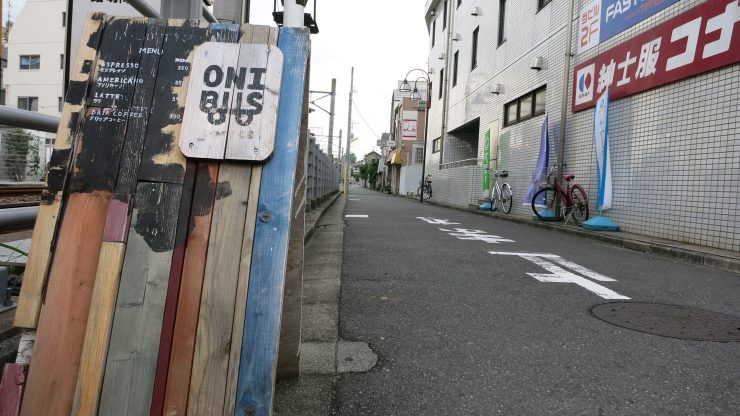
During the day, Onibus Coffee is a hub for neighborhood connection. Customers talk at the tables inside, or outside on the bench by the train lines. They chat and banter. Sip at coffee. Listen to the Meguro Line as the trains rumble by. Sometimes people drop by for beans, other times just to say hello.
Inside, barista and roaster Takaya Hashimoto is glued to the little red roaster by the entrance. Gaps in conversation are filled by pop music. Periodically the grinder plays percussion. There’s the tap-tap-tap of the handle on the grinder, and the hiss of the steam wand. Water drips through Hario filter cones. The shop runs to its own kind of rhythm. Its own unique soundtrack.
There’s warmth here. Partially it’s the constant roasting. Partially it’s something else I can’t quite put my finger on. Sitting down at the table in the corner with owner Atsushi Sakao, I think about how quiet it can be here in the evening. Except for the few people looking for a night cap, everything is winding down.
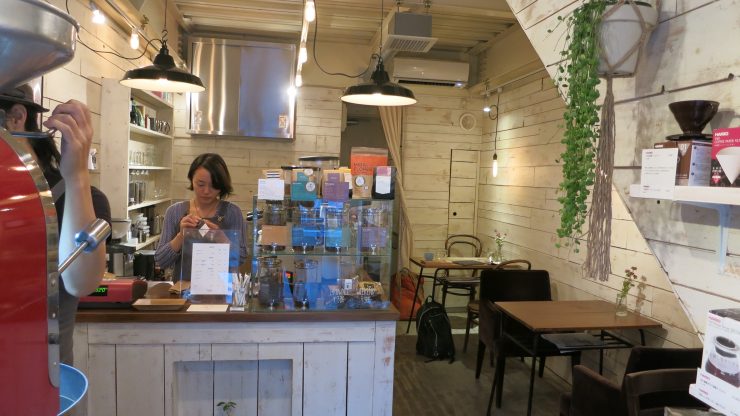
Sakao says he started out in architecture. He went to architectural college, then joined an architecture company. It didn’t work out. For a time he found himself back home in Chiba, helping his father with the carpentry business. Lost between settling down in the country or trying life in the big city, Sakao chose a momentary escape. He chose backpacking. Along the way through Australia, he discovered specialty coffee. That was all it took—upon returning home, his path was set.
After two and a half years with Paul Bassett, Sakao went independent. He says he found Okusawa by chance. He’d worked the business district for too long; he wanted something more local. He saw potential and connection. Together with friends, he built, then opened, the space now known as Onibus Coffee.
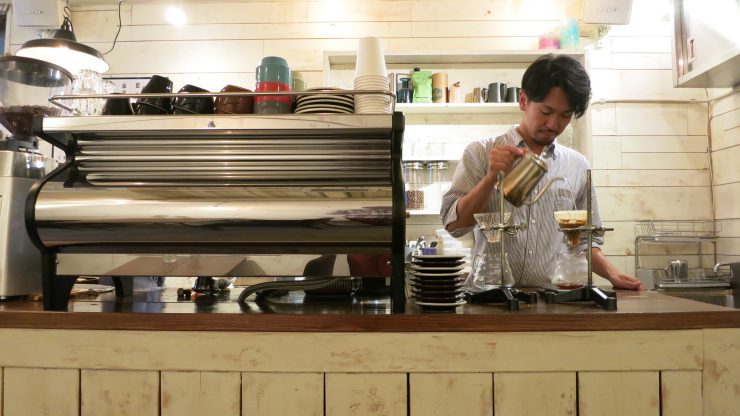
“The name Onibus means ‘public bus’ in Portuguese. The buses drive between neighborhoods, and connect people to each other. But the meaning at the heart of it is a service for everyone. I want to use coffee to connect people, to roast and brew coffee for the people of Okusawa, and Tokyo.”
I look around the space. At the bright red roaster, the garage-style DIY drip setup, the white-washed wooden cottage design. It’s humble, and simple, and it resonates with a straightforward, relaxed vibe you feel from Sakao too. He’s passionate and driven, but it’s not something you can easily glean from talking to him—it’s largely his actions that speak for him, and slowly carve his path through the specialty coffee scene.
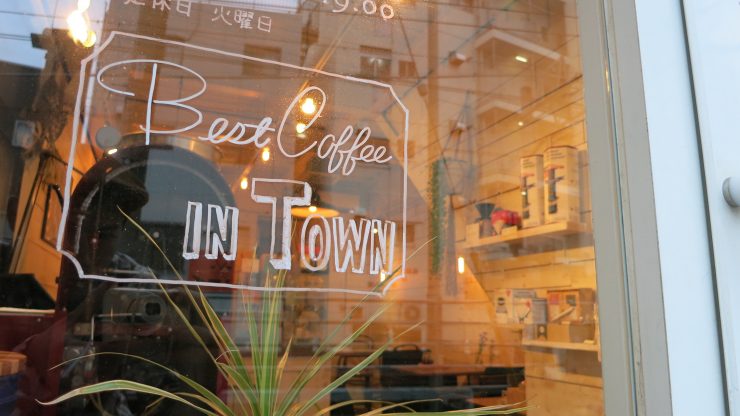
To further the spread of specialty coffee, Sakao held workshops, seminars, and events. He thought about how to reach out and connect more people. After all, everyone drinks coffee—the problem is that not everyone thinks about what they’re drinking. This led to an idea—setting up a place in the heart of the city, easily visible and just as visitable, serving a variety of quality coffee. The idea bloomed into About Life, a multi-roaster coffee stand in the heart of Shibuya.
“The name About Life is about taking a second look at our lifestyles through taking a closer look at coffee. Good coffee is a chance for people to look at how they can improve their lives. It’s our goal to have people come to understand specialty coffee better. These kinds of realizations have a snowball effect. I’ve met great people through working with coffee, and I want others to share in that.”
Sakao, too, took a careful look at coffee, and life, and their future together. He realized it wasn’t just about Tokyo. It wasn’t just about Japan. It was just as much about the source. It was about understanding the people, the farms, and the process. His next steps took him to source locations—last year to Guatemala and Costa Rica, this year to Rwanda.
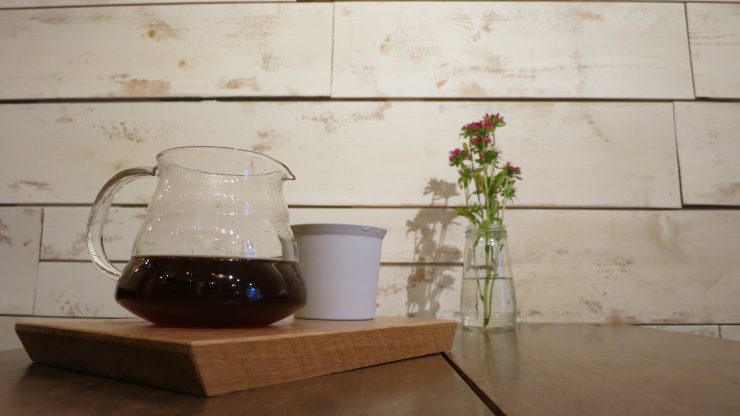
“Honestly, I’m still just trying to learn as much as I can,” Sakao says. “This is only my second time visiting a plantation. But I started thinking it was important to see the process up close, and get a better understanding of it. We can’t start investing in Direct Trade because Onibus is still small, but we can start creating bonds with the producers of the coffee.”
“Going to farms and talking directly with enthusiastic, dedicated farmers: this is how we can start discussions on improving and maintaining quality as we grow.”
It all feels like groundwork. The rumblings of a change somewhere far off in the distance. These are the first steps to creating the relationships that will result in better quality coffee years from now.
And yet, for all the groundwork, and for all the big plans and successes, Sakao says his favorite place is behind the bar. Pouring coffee. Pulling shots. Making that direct connection between coffee and customer. He pours his coffee with a casual look, but there’s careful consideration there too. It exudes from the coffee, and the man, and the people he surrounds himself with.
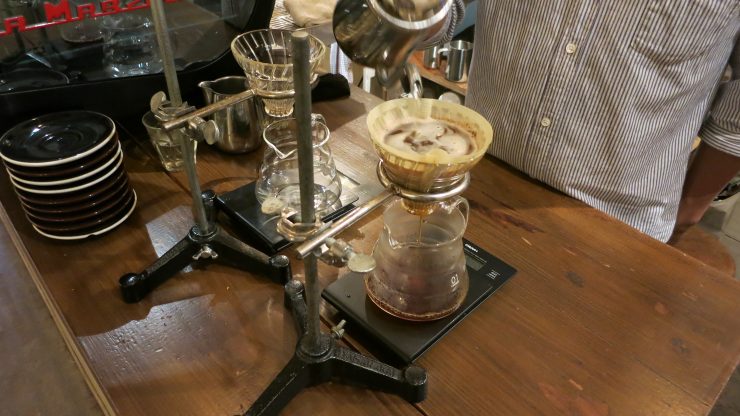
And I think, maybe, that’s the warmth I note in the Onibus space. It’s something like family. As we finish up, and banter about the difficulties of picking up a second language, and whether Australian English or American English is more difficult to understand, I start to get a clearer sense of it.
The specialty coffee scene in Tokyo is growing, but it’s still small. Everyone in the business will tell you that. But at the same time, I wonder if that isn’t the very reason that the specialty coffee community here is so close and tight-knit—everyone rides the same onibus to the same neighborhoods, and all the passengers know each other.
Onibus Coffee is located at 5 Chome-1-4 Okusawa, Setagaya-ku, Tokyo.
Hengtee Lim (@Hent03) is a Sprudge.com staff writer based in Tokyo. Read more Hengtee Lim on Sprudge.
The post Onibus Coffee: A Hub For Neighborhood Connection In Tokyo appeared first on Sprudge.

